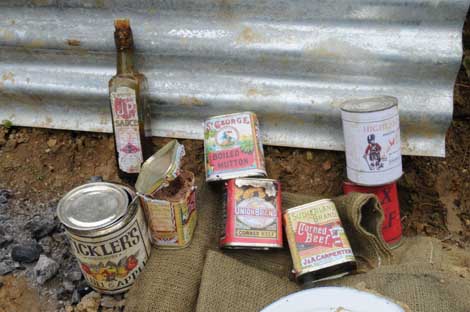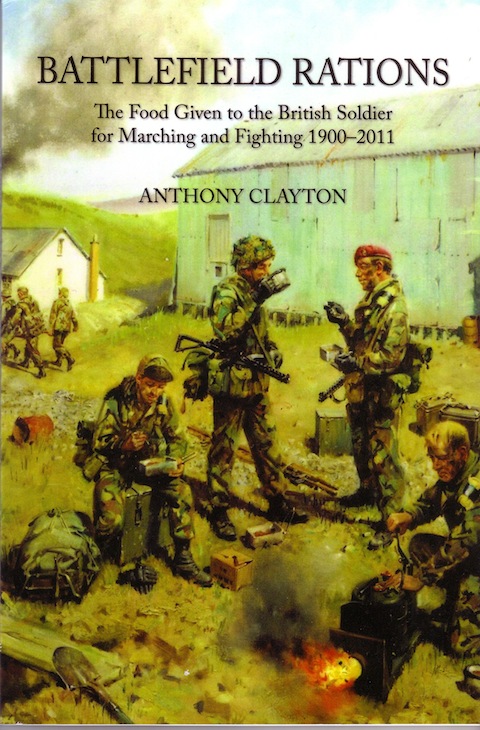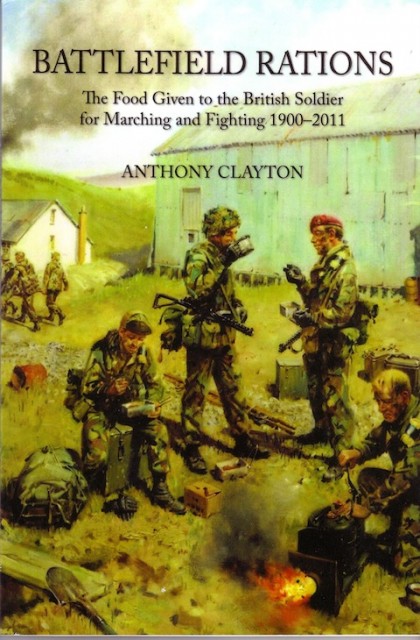BATTLEFIELD RATIONS
The Food Given to the British Soldier for Marching and Fighting 1900-2011
By Anthony Clayton
Helion & Company
ISBN: 978 1 909384 18 7
Review by Mark Barnes
It’s been a busy week. On Monday I was at a talk given by a well known historian discussing the joys of soldiering during the Great War and, given his vast knowledge of wider history and soldiering he made a remark which hit home. He was talking about young soldiers having to do a stint in the butts and getting used to the impact of gunfire. It took me back to my own experience of this over thirty five years ago when I was that soldier. There we were in the muddy butts of a range somewhere in England and I was in a bind because I’d ruined my DMS boots (nearly an oxymoron as it goes). Other nonsense had gone on and it had not been a classic day. One of our number was causing some ire because he insisted on loudly referring to a fusilier NCO as “the bloke with the budgie on his hat”. He would make us work harder thanks this intemperate description as the day wore on. We ate our lunch sitting in the mud and all I remember of it is the slice of fruit cake. I can still taste it.
Jump to Tuesday of this week and I attended the launch of this book in the ornate surroundings of one of those grand gentlemen’s clubs in central London. I was one of a small number not wearing a regimental tie of some description. General the Lord Dannatt was in the house, topping a list of brass and class. I stuck to the orange juice.
We were treated to a couple of brief talks related to the book and there was a display of ratpacks and other stuff you will find remnants of in my house thanks to both my kids recently quitting the Air Training Corps. Somehow the Tabasco sauce survived being thrown out and there were some useful bits of cooking equipment for outdoors worth keeping. The talks were good fun and I was especially taken by the author, a chap it is fair to say of advanced years; who clearly knows his stuff and how to keep an audience engaged. These qualities transfer to the book itself. Not the longest by any means, it is crammed with useful information and is very entertaining with it. The subject might seem a tad left field – but again, going back to our speaker on Monday night; the importance of food (and tea) to the British Army cannot be underestimated. It often ruled events and in the case of men serving in the Great War, the vast majority of them had never had so many calories in their lives. There were even times when they had too much food and some of it went to waste.

Examples of some of the delights used by Tommies to supplement their rations in the Great War.
Dr Clayton takes us from the Boer War to the present day in a brisk and ebullient manner. There is nothing to dislike here, the info is all handy and some is quite surprising. Books brimming with facts are always a hit with me. One of his nuggets, so good, our chum General Dannatt borrowed it for his forward, is the origin of the word scoff, squarely implanted in general language but with a firmly military background. It comes from the Boer War when the packaged food used by the British Army was marked with Senior Catering Officer Field Force. Simple as.
My military career was brief and misguided, but while I carry memories of those days more with affection than pride, things like the cake remind me that food was as important as the author makes plain. I really didn’t want to use Napoleon’s classic An army marches on it’s stomach quote, but everyone else reviewing this book will and although I don’t have a regimental tie, I do have some idea what they are talking about.
When I joined the army my dad warned me that all I would be doing was ‘bull’ – polishing kit, doing pointless tasks or peeling potatoes. I told him he was mad. This was the modern age, not 1939. A short time in and I found myself, guilty of an infraction, staring at an enormous pile of spuds. They threw in onions for good measure. Point taken. Once peeled, the cooks produced an enormous steak and onions meal for a platoon of us on a tiny stove in a hut in the middle of nowhere. It was magnificent. I think this cements the reason for this book, the profits of which all go to the Army Benevolent Fund. It’s a gem and well worth your time if logistics are your fayre. Maybe you’re just nostalgic for compo rations, or like me you haven’t thrown out the Tabasco sauce, either.
~Mark Barnes

